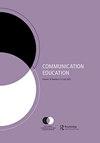“我们不会大声说出来”:一个分析语言和社交课堂中困难数据的有根据的实践理论
IF 0.8
Q3 COMMUNICATION
引用次数: 0
摘要
摘要在这篇文章中,我们使用扎根的实践理论来开发一个在大学语言与社会互动课程中使用“困难数据”的实践理论。“困难数据”是转录的音频/视频记录数据,其中包含可能具有攻击性、偏执或其他令人不安的语言和意识形态。我们提供了上下文文献,以了解围绕使用这些来自传播教育学研究的数据的教学紧张关系,以及处理数据中语言的社会理论。我们的分析基于学术界的各种类型的数据:国际/跨文化教学演讲活动、学生调查、现场笔记、访谈和使用困难数据的课堂教学录音。我们提供了一个实用的理论,专注于管理核心问题的技术,即教师希望学生分析互动的社会后果,而不复制使困难数据变得困难的话语的问题影响。我们的理论揭示了四种技术,包括将数据框定为困难数据、课前调查学生、使用已经发表的研究数据以及对这些困境进行元沟通。这些技术并不保证不可侵犯,但教师可以促进对课堂互动的深思熟虑的反思/共同导向,考虑使用困难的数据是否可以帮助学生发展分析知情的实践。本文章由计算机程序翻译,如有差异,请以英文原文为准。
“We don’t say that word out loud”: a grounded practical theory for analyzing difficult data in language and social interaction classrooms
ABSTRACT In this article, we use grounded practical theory to develop a practical theory for using “difficult data” in Language and Social Interaction university classes. “Difficult data” are transcribed, audio/video-recorded data that contain language and ideologies that could be offensive, bigoted, or otherwise disturbing. We provide contextual literature for understanding the pedagogical tensions around using these data from communication pedagogy research as well as social theory for handling the language within the data. We base our analysis on various types of data from academia: an international/intercultural pedagogical speech event, student surveys, field notes, interview, and recordings of classroom instruction using difficult data. We provide a practical theory focused on techniques for managing the central problem that instructors want students to analyze the social consequences of interaction without replicating the problematic impacts of discourse that make difficult data difficult. Our theory reveals four techniques including framing the data as difficult, surveying students before the class, using already-published research data, and metacommunicating about these dilemmas. These techniques do not promise inviolability, but instructors can foster deliberative reflection/co-orientation about classroom interaction that considers whether the use of difficult data can help students develop analysis-informed praxis.
求助全文
通过发布文献求助,成功后即可免费获取论文全文。
去求助
来源期刊

COMMUNICATION EDUCATION
EDUCATION & EDUCATIONAL RESEARCH-
CiteScore
3.10
自引率
34.80%
发文量
47
期刊介绍:
Communication Education is a peer-reviewed publication of the National Communication Association. Communication Education publishes original scholarship that advances understanding of the role of communication in the teaching and learning process in diverse spaces, structures, and interactions, within and outside of academia. Communication Education welcomes scholarship from diverse perspectives and methodologies, including quantitative, qualitative, and critical/textual approaches. All submissions must be methodologically rigorous and theoretically grounded and geared toward advancing knowledge production in communication, teaching, and learning. Scholarship in Communication Education addresses the intersections of communication, teaching, and learning related to topics and contexts that include but are not limited to: • student/teacher relationships • student/teacher characteristics • student/teacher identity construction • student learning outcomes • student engagement • diversity, inclusion, and difference • social justice • instructional technology/social media • the basic communication course • service learning • communication across the curriculum • communication instruction in business and the professions • communication instruction in civic arenas In addition to articles, the journal will publish occasional scholarly exchanges on topics related to communication, teaching, and learning, such as: • Analytic review articles: agenda-setting pieces including examinations of key questions about the field • Forum essays: themed pieces for dialogue or debate on current communication, teaching, and learning issues
 求助内容:
求助内容: 应助结果提醒方式:
应助结果提醒方式:


